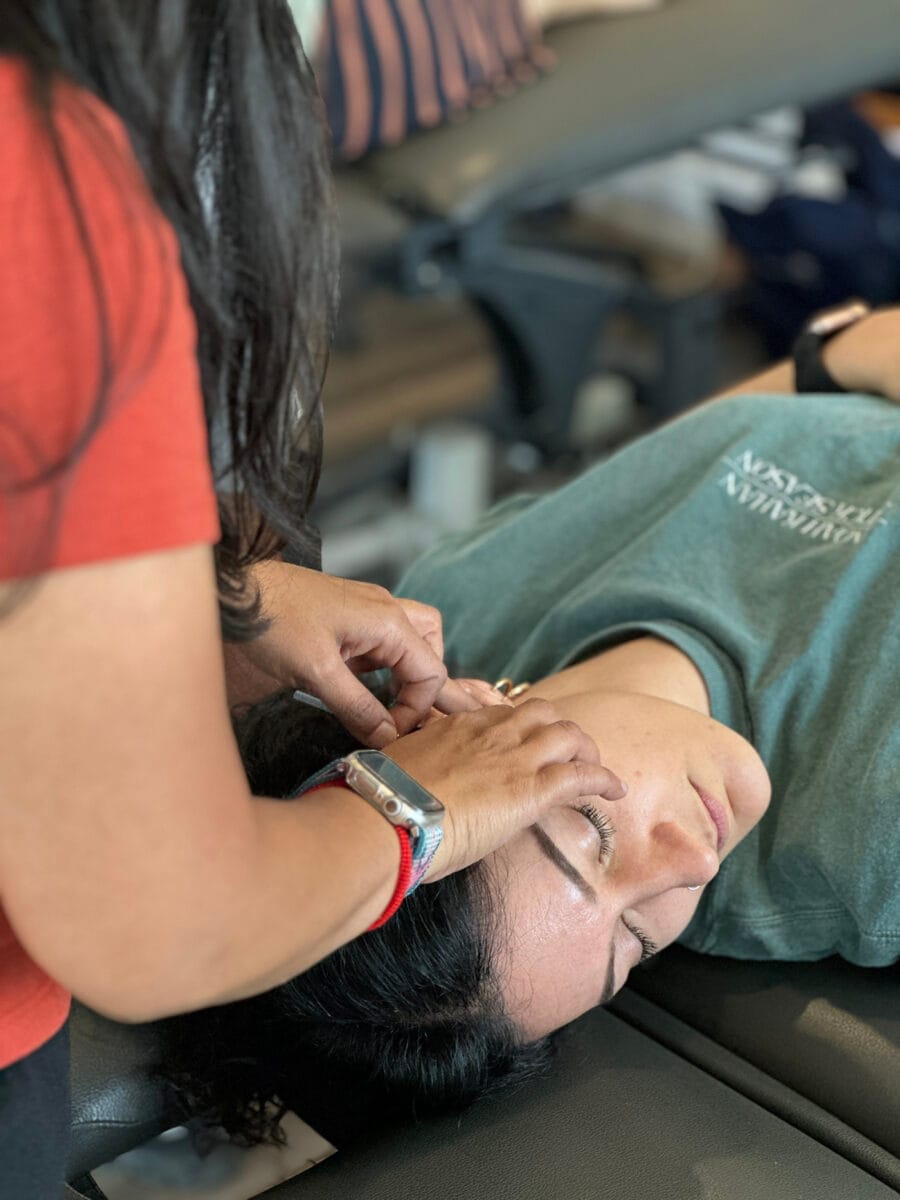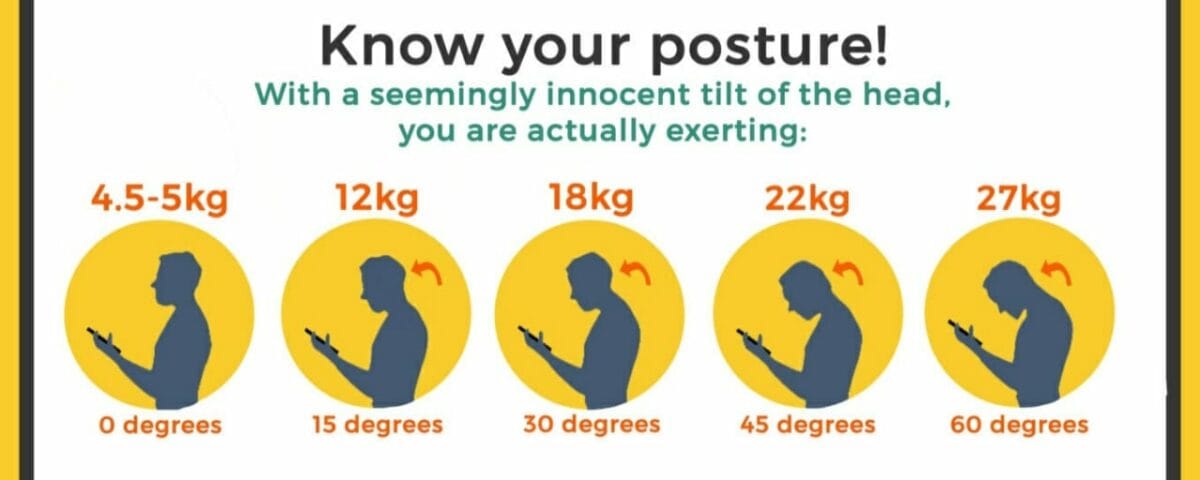Tension headaches are one of the most common forms of headache, often described as a constant ache or pressure around the forehead, temples, or back of the head. Unlike migraines, tension headaches usually don’t come with nausea or sensitivity to light, making them easy to overlook but challenging to manage for those who experience them frequently. In this blog, we’ll look into recovery strategies, including neuromuscular exercises, mobility incorporation, and progressive resistance exercises, as well as prevention techniques to help manage future occurrences.
The physiotherapists at Triangle Physiotherapy are happy to share practical tips and strategies to relieve you of your tension headaches.
What Recovery Involves
Recovery from tension headaches often involves addressing the underlying muscle tension and stress that contribute to their onset. These headaches can be triggered by various factors, including poor posture, prolonged sitting, stress, and lack of physical activity. A comprehensive recovery plan should focus on both immediate relief and long-term strategies to reduce the frequency and intensity of headaches. \
Neuromuscular Exercises
Neuromuscular exercises are designed to improve the coordination and function of the muscles involved in head and neck movement. These exercises can help alleviate tension and prevent future headaches by:
Strengthening Weak Muscles: Focus on the neck, shoulders, and upper back, which often harbor tension.
Improving Posture: Correcting posture can significantly reduce the strain on muscles and prevent the buildup of tension.
Promoting Relaxation: Gentle stretches and relaxation techniques can help reduce stress and muscle tightness. Examples of neuromuscular exercises include chin tucks, neck stretches, and shoulder rolls. Consistent practice can enhance muscle function and overall comfort.

Mobility Incorporation
Incorporating mobility exercises into your routine is vital for maintaining flexibility and preventing stiffness that contributes to tension headaches. Mobility exercises can include:
Dynamic Stretching: Engaging in movements that promote range of motion, such as arm circles and torso twists.
Foam Rolling: Targeting tight muscle groups in the neck, shoulders, and upper back can release tension and improve blood flow.
Yoga or Pilates: These practices emphasize controlled movements and breathwork, promoting both physical and mental relaxation.
Aim to incorporate mobility exercises into your daily routine, especially if you have a sedentary lifestyle.
Progressive Resistance Exercises for Tension Headaches
Progressive resistance exercises help build strength and endurance in the muscles that support your head and neck. A strong musculoskeletal system can better handle physical stressors, reducing the likelihood of tension headaches. Key components include:
Resistance Bands: Incorporating band exercises for the shoulders and upper back can help strengthen these areas.
Weight Training: Focus on compound movements like deadlifts and rows that engage multiple muscle groups.
Gradual Increase: Start with lighter weights or resistance and gradually increase as your strength improves.
This approach not only enhances physical strength but also boosts overall confidence and body awareness.
Prevention of Tension Headaches
Preventing tension headaches involves a multi-faceted approach:
1. Regular Exercise: Aim for at least 30 minutes of moderate exercise most days of the week to promote overall well-being.
2. Stress Management: Techniques such as meditation, deep breathing, and mindfulness can help manage stress levels.
3. Ergonomics: Ensure that your workspace is set up to promote good posture and reduce strain on your neck and shoulders.
4. Hydration and Nutrition: Staying hydrated and maintaining a balanced diet can play a crucial role in overall health and headache prevention.
5. Sleep Hygiene: Prioritize good sleep habits, as lack of sleep can trigger headaches.
FAQs
Q: What are the common triggers for tension headaches?
A: Common triggers include stress, poor posture, eye strain, dehydration, and muscle tension.
Q: How can I differentiate between a tension headache and a migraine?
A: Tension headaches typically present as a dull, aching pain with a sensation of tightness, whereas migraines are often accompanied by nausea, vomiting, and sensitivity to light or sound.
Q: When should I see a doctor for my headaches?
A: If headaches become frequent, severe, or are accompanied by other concerning symptoms, it’s essential to seek medical advice.
Q: Can lifestyle changes really help reduce tension headaches?
A: Yes, adopting a healthy lifestyle with regular exercise, stress management, and good posture can significantly reduce the frequency and severity of tension headaches.
Q: Are there any specific exercises I should avoid?
A: Avoid exercises that strain the neck or upper back, especially if you experience pain during or after the activity. Tension headaches can be managed effectively with the right strategies in place. By incorporating neuromuscular exercises, enhancing mobility, and building strength through progressive resistance exercises, you can pave the way for recovery and prevention.
Book an appointment with our expert physiotherapists, chiropractors or massage therapists to get relief from your nagging tension headaches today!
Headaches and migraines are common conditions that can significantly impact quality of life. For many people, these conditions can become chronic, leading to frequent discomfort and reduced quality of life. While medication may provide temporary relief, it often doesn’t address the underlying causes of the pain. This is where physiotherapy comes in. Specifically, those in Etobicoke can benefit from a comprehensive, holistic approach to managing headaches and migraines through physiotherapy.
Understanding the Root Causes of Headaches and Migraines
Headaches and migraines can arise from various factors, including:
- Muscle Tension: Chronic muscle tension in the neck, shoulders, and jaw can contribute to headaches.
- Poor Posture: Poor posture can lead to misalignment of the spine, straining muscles and nerves.
- Stress and Anxiety: Emotional stress can trigger or exacerbate headaches.
- Temporomandibular Joint (TMJ) Disorder: Problems with the jaw joint can cause headaches and facial pain.

How Physiotherapy Can Help
1. Postural Correction
Many headaches are caused by poor posture, particularly when sitting for long periods. Physiotherapists in Etobicoke work on posture correction, educating patients on proper alignment and offering exercises to strengthen muscles that support a healthy posture.
2. Manual Therapy
Manual therapy techniques, such as soft tissue massage, joint mobilizations, and trigger point therapy, can help release muscle tension and improve mobility in the neck and shoulders, reducing the frequency and intensity of headaches.
3. Cervical Spine Alignment
Misalignment in the cervical spine can contribute to headaches and migraines. Physiotherapists in Etobicoke can assess the spine and provide treatments to realign vertebrae, decreasing nerve irritation and reducing headaches.
4. Stress Management Techniques
Stress is a common trigger for both headaches and migraines. Physiotherapy includes relaxation techniques, breathing exercises, and even guided stretches that help reduce stress, promoting relaxation and decreasing the likelihood of headache onset.
5. Exercise Prescription
Targeted exercises strengthen the muscles of the neck, shoulders, and upper back, helping patients develop a more resilient posture and reducing muscle tension that can lead to headaches. Home exercise programs are often prescribed to maintain these benefits between sessions.\
6. Dry Needling
This technique involves inserting thin needles into trigger points, which are areas of muscle tension or knots. Dry needling can help reduce pain and improve muscle function.

FAQs About Physiotherapy for Headaches and Migraines
Can physiotherapy really help with headaches and migraines?
Yes, physiotherapy in Etobicoke offers a holistic treatment plan that addresses the underlying musculoskeletal causes of headaches and migraines, providing relief and helping to prevent future episodes.
How many physiotherapy sessions will I need?
The number of sessions varies based on the severity of your condition and how well your body responds to treatment. Most patients start to notice significant improvements within 4-6 sessions, but a more personalized plan will be created during your assessment.
Do I need a doctor’s referral to see a physiotherapist?
In most cases, you do not need a doctor’s referral to start physiotherapy in Etobicoke for headaches or migraines. However, it’s always a good idea to check with your insurance company.
What can I expect during my first physiotherapy session?
During your initial visit, the physiotherapist will perform a comprehensive assessment, reviewing your medical history, posture, and muscle function. Based on the findings, a tailored treatment plan will be designed to target your specific symptoms.
Headaches and migraines are often a result of underlying musculoskeletal problems, poor posture, and stress. A holistic approach to physiotherapy in Etobicoke not only alleviates the symptoms but also addresses the root causes, offering long-term relief. By working with a trained physiotherapist, you can significantly reduce the frequency and intensity of your headaches and enjoy a higher quality of life.
If you’re tired of dealing with chronic headaches or migraines, consider physiotherapy in Etobicoke as a natural and effective solution to your pain. Reach out to a qualified physiotherapist to begin your journey toward better health and wellness today.
A stiff neck refers to a condition where the muscles in the neck feel tight, sore, and difficult to move.
What are the causes of a stiff neck?
A Stiff Neck can be caused by various factors, including muscle strain, tension, or injury. Some common causes of a stiff neck include:
- Muscle Strain: Overuse or sudden movements that strain the neck muscles can lead to stiffness.
- Poor Posture: Maintaining an improper posture, especially for extended periods, can contribute to neck stiffness.
- Sleeping Position: Sleeping in an awkward or uncomfortable position, or using a pillow that doesn’t support the neck properly, may result in stiffness.
- Neck Injury: Accidents or injuries, such as whiplash from a car accident, can cause neck stiffness.
- Stress and Tension: Emotional stress and tension can contribute to muscle tension and stiffness in the neck.
- Text Neck: Spending extended periods looking down at electronic devices, such as smartphones or tablets, can strain the neck and lead to stiffness.
- Underlying Medical Conditions: Certain medical conditions, such as arthritis, cervical spine disorders, or infections, can also cause a stiff neck.

How do I fix a stiff neck?
Do not despair, there are many ways to help resolve a stiff neck.
- Stretch – Visit a physiotherapist or chiropractor and they can show you the best stretches for a stiff neck.
- Massage Therapy – Book an appointment with a registered massage therapist who can help release the knots and help with relaxing the tight muscles.
- Use a heating pad to get some relief from the pain. A hot shower helps as well.
- Manual Therapy – See a physiotherapist who can use manual therapy techniques to release and mobilize the joint.
- Dry-needling – A physiotherapist who does dry-needling can make a difference in resolving your stiff neck.
- Sleeping Position – Your physiotherapist can educate you on modifying your sleeping position so that your stiff neck does not become a recurring problem.
How do I book an appointment with a Physiotherapist near me?
Click HERE to book an appointment with a physiotherapist or chiropractor at one of our eight locations.
- Physiotherapy Etobicoke – Triangle Physiotherapy Etobicoke
- Oakville Physiotherapy Clinic – Triangle Physiotherapy Oakville
- Physiotherapy North York – Triangle Physiotherapy North York
- Mississauga Physiotherapy Clinics – Triangle Physiotherapy Mississauga
- Downtown Physiotherapy Clinics – Triangle Physiotherapy King West
- Uptown Physiotherapy Clinics – Triangle Physiotherapy Lawrence Park
- Physiotherapy Clinic Downtown Toronto – Triangle Physiotherapy Queens Quay
- Physiotherapy Clinics Mississauga – Triangle Physiotherapy Erin Mills
“Dealing with a stiff neck can be painful and frustrating, but with the right physiotherapy, relief is possible. Triangle Physiotherapy offers expert care across the GTA, including Physiotherapy in Etobicoke, Oakville, North York, Toronto, Lawrence Park, Queens Quay, Erin Mills, Mississauga, and Liberty Village. Our skilled therapists are here to help you alleviate neck stiffness and improve your mobility.”




